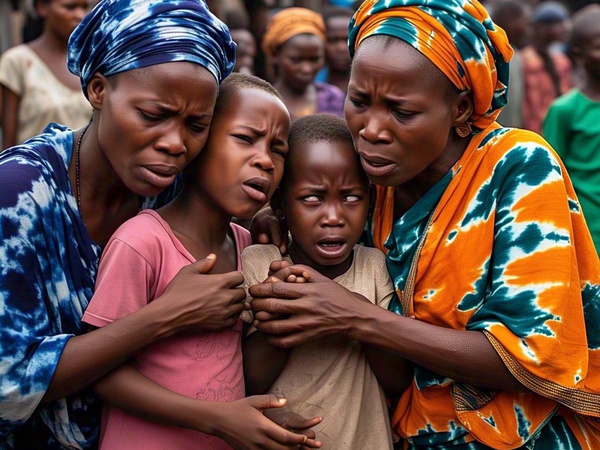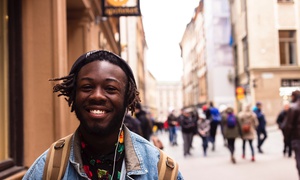<p><span>Let’s be honest — Nigeria has a habit of forgetting. We mourn today, move on tomorrow, and pretend like everything’s fine until it hits close to home. But Boko Haram never left. While we danced on TikTok and chased soft life, they were planning. Now they’re back, and we’re still acting suprised??!! We thought the worst was over. That the gunfire had faded, that the North could finally breathe again. </span></p>
<p><span>But in the shadows, something darker has been brewing — and now, Boko Haram is back with deadlier tactics and renewed violence. This isn't just another security update. It's a wake-up call.</span></p>
<p><span>In the early 2010s, Boko Haram's reign of terror gripped Nigeria, particularly the northeastern region. Over the years, intensified military operations and regional collaborations seemed to have curtailed their activities. However, recent developments indicate a disturbing resurgence of this extremist group, raising concerns about national security and the well-being of countless Nigerians.</span></p>
<p><br></p><p><strong>THEIR REVIVAL MARKING THEIR SOPHISTICATION</strong></p><p><br></p><p>Recent attacks in Borno and Adamawa states have resulted in the deaths of at least 48 individuals. Notably, these assaults have showcased a heightened level of sophistication, with Boko Haram and its offshoot, the Islamic State West Africa Province (ISWAP), employing armed drones and improvised explosive devices (IEDs) to target both civilians and military installations.</p><p>One particularly harrowing incident involved a roadside bombing between Rann and Gamboru in Borno State, where 26 people, including women and children, lost their lives. ISWAP claimed responsibility for this attack, underscoring the group's intent to instill fear and disrupt daily life.</p><p><strong>WHAT ARE THE FACTORS THAT FUELED THEIR COMEBACK</strong></p><p>- Reduced Infighting: Previously, internal conflicts between Boko Haram factions weakened their operations. Now, a semblance of unity has emerged, bolstering their collective strength.</p><p>- External Support: Reports suggest increased tactical support and funding from international extremist networks, enhancing their operational capabilities. </p><p>- Advanced Weaponry: The adoption of sophisticated weapons, including drones, indicates a strategic shift aimed at maximizing impact and evading traditional defense mechanisms.</p><p><strong>IMPLICATIONS SET OUT FOR NIGERIA</strong></p><p>Their reappearance posses so many challenges and risks to we the people</p><p>- Renewed attacks have led to mass displacements, Fuelling the already dire humanitarian situation in the northeast.</p><p>- Farming and Food Are Suffering: For many people up North, farming is life. But with attacks happening, farmers can’t go to their fields safely. This means less food, higher prices, and more hunger — not just in those areas, but across the country.</p><p>- The Emotional Toll And Mental Health Challenges: Imagine growing up where gunshots and fear are normal. That’s the reality for many children in these regions. Years of violence don’t just hurt physically — they leave deep emotional scars, especially on the young.</p><p><strong>WHAT IS THE GOVERNMENT DOING ABOUT THIS? </strong></p><p>To respond to this new wave of attacks, the Nigerian military has put Major General Abdulsalam Abubakar in charge of the counter-terrorism efforts. He’s got a strong track record in handling security issues, and there’s hope his leadership brings some real change on the ground.</p><p><br></p><p>Addressing the Boko Haram threat requires a <strong>New</strong>approach:</p><p>- Community Engagement: Empowering local communities to participate in security initiatives can foster trust and enhance intelligence gathering.</p><p>- Regional Collaboration: Strengthening ties with neighboring countries can facilitate coordinated efforts to dismantle cross-border extremist networks.</p><p>- Socio-Economic Development: Investing in education, infrastructure, and job creation can address the root causes of radicalization, offering alternative pathways for at-risk populations.</p><p>That's a strong and clear closing statement, Velora. To make it more impactful and resonate emotionally with your audience, here’s a slightly refined version:</p><p><br></p>
<p><span>The resurgence of Boko Haram isn't just a northeastern crisis — it's a Nigerian reality we can no longer ignore. From failed security strategies to youth disillusionment, the roots run deep. But with informed action and national unity, we can reclaim our peace and write a new chapter — one where fear no longer dictates our future.~it's a national emergency demanding unity, strategy, and empathy. While military force plays a vital role, true peace will come only when communities feel safe, young people see hope beyond extremism, and Nigeria rises with one voice to say, “Never again.” The time for action is now, and it starts with awareness, collaboration, and unwavering resilience.</span></p>
<blockquote><span>“Terrorism anywhere is a threat to peace everywhere. We can’t wait for violence to reach our doorstep before we speak up — silence is how it spreads.”</span></blockquote>












Comments